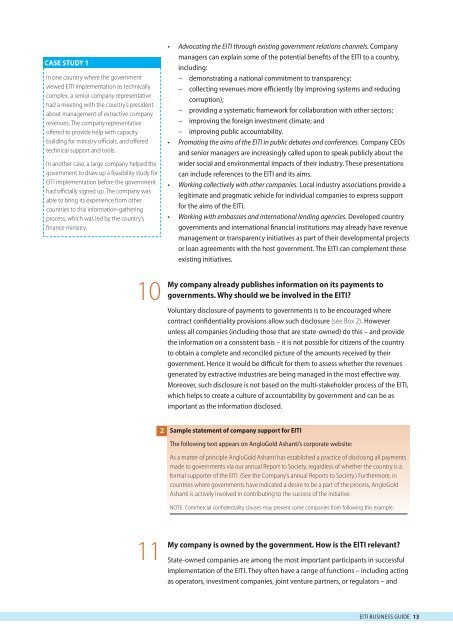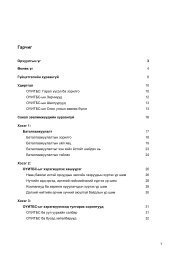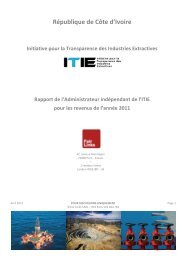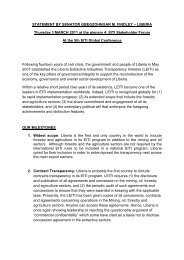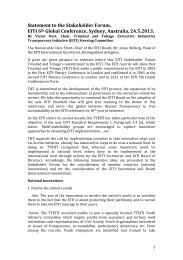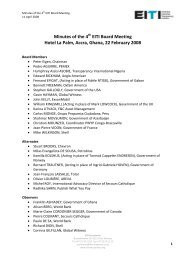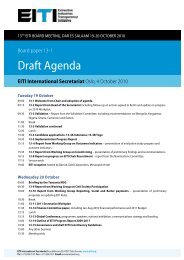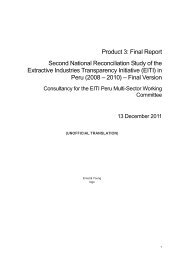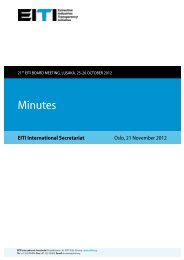EITI Business Guide
EITI Business Guide
EITI Business Guide
Create successful ePaper yourself
Turn your PDF publications into a flip-book with our unique Google optimized e-Paper software.
CASE STUDY 1<br />
In one country where the government<br />
viewed <strong>EITI</strong> implementation as technically<br />
complex, a senior company representative<br />
had a meeting with the country’s president<br />
about management of extractive company<br />
revenues. The company representative<br />
offered to provide help with capacity<br />
building for ministry officials, and offered<br />
technical support and tools.<br />
In another case, a large company helped the<br />
government to draw up a feasibility study for<br />
<strong>EITI</strong> implementation before the government<br />
had officially signed up. The company was<br />
able to bring its experience from other<br />
countries to this information-gathering<br />
process, which was led by the country’s<br />
finance ministry.<br />
10<br />
2<br />
11<br />
• Advocating the <strong>EITI</strong> through existing government relations channels. company<br />
managers can explain some of the potential benefits of the <strong>EITI</strong> to a country,<br />
including:<br />
– demonstrating a national commitment to transparency;<br />
– collecting revenues more efficiently (by improving systems and reducing<br />
corruption);<br />
– providing a systematic framework for collaboration with other sectors;<br />
– improving the foreign investment climate; and<br />
– improving public accountability.<br />
• Promoting the aims of the <strong>EITI</strong> in public debates and conferences. company cEos<br />
and senior managers are increasingly called upon to speak publicly about the<br />
wider social and environmental impacts of their industry. These presentations<br />
can include references to the <strong>EITI</strong> and its aims.<br />
• Working collectively with other companies. Local industry associations provide a<br />
legitimate and pragmatic vehicle for individual companies to express support<br />
for the aims of the <strong>EITI</strong>.<br />
• Working with embassies and international lending agencies. developed country<br />
governments and international financial institutions may already have revenue<br />
management or transparency initiatives as part of their developmental projects<br />
or loan agreements with the host government. The <strong>EITI</strong> can complement these<br />
existing initiatives.<br />
My company already publishes information on its payments to<br />
governments. Why should we be involved in the <strong>EITI</strong>?<br />
voluntary disclosure of payments to governments is to be encouraged where<br />
contract confidentiality provisions allow such disclosure (see Box 2). However<br />
unless all companies (including those that are state-owned) do this – and provide<br />
the information on a consistent basis – it is not possible for citizens of the country<br />
to obtain a complete and reconciled picture of the amounts received by their<br />
government. Hence it would be difficult for them to assess whether the revenues<br />
generated by extractive industries are being managed in the most effective way.<br />
Moreover, such disclosure is not based on the multi-stakeholder process of the <strong>EITI</strong>,<br />
which helps to create a culture of accountability by government and can be as<br />
important as the information disclosed.<br />
Sample statement of company support for <strong>EITI</strong><br />
The following text appears on angloGold ashanti’s corporate website:<br />
As a matter of principle AngloGold Ashanti has established a practice of disclosing all payments<br />
made to governments via our annual report to Society, regardless of whether the country is a<br />
formal supporter of the <strong>EITI</strong>. (See the Company’s annual reports to Society.) Furthermore, in<br />
countries where governments have indicated a desire to be a part of the process, AngloGold<br />
Ashanti is actively involved in contributing to the success of the initiative.<br />
NOTE: Commercial confidentiality clauses may prevent some companies from following this example.<br />
My company is owned by the government. How is the <strong>EITI</strong> relevant?<br />
state-owned companies are among the most important participants in successful<br />
implementation of the <strong>EITI</strong>. They often have a range of functions – including acting<br />
as operators, investment companies, joint venture partners, or regulators – and<br />
<strong>EITI</strong> BusInEss GuIdE 13


